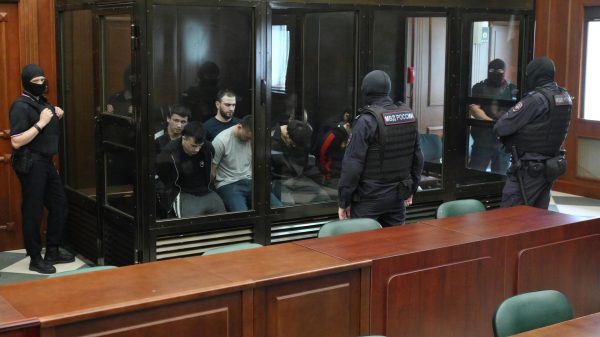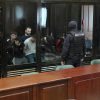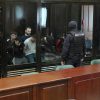 Rep. Kevin McCarthy Photo: Photographer: Nathan Howard/Bloomberg/Photographer: Nathan Howard/Bloomberg
Rep. Kevin McCarthy Photo: Photographer: Nathan Howard/Bloomberg/Photographer: Nathan Howard/Bloomberg
Today on Telegraph Ukraine: In the latest podcast, we bring you news from the front lines and discuss the historic ouster of House Speaker Kevin McCarthy in the United States. Additionally, Frances Dearnley interviews President Donald Trump's former deputy national security adviser Victoria Coates, and David Knowles talks with Robert Dore, president of the American Enterprise Institute, about American support for Ukraine.
Talking about the resignation of Republican Speaker Kevin McCarthy, US Growth Editor Jamie Johnson explains the historical events in Washington, D.C.
In a nutshell, Kevin McCarthy was ousted by conservatives within his party, partly over a dispute over funding for Ukraine.
Speaking afterwards, Mr McCarthy said he supported arming Ukraine and said what was happening was «very much like the 1930s» in Germany.
He said: “Many of the actions that Putin is taking are very similar to Hitler, and I am afraid of making the same mistake twice. And send the wrong messages. But I want to tell everyone that more Americans are dying on the [US] southern border than in Ukraine.”
So what happens next? Well, as it stands, the plan is quite simple. They'll take a week, try to choose a new speaker, and then get back on track. But as we know, things like this aren't that simple.
There isn't much confidence within House Republicans that they can heal their differences and come together around the time when new speaker
Robert Doar from the AEI shares his views on Republican support for Ukraine.
Sometimes we are very concerned about the minority voices that make a lot of noise in the opposition, and we lose sight of the fact that the appropriations bill has been passed, the money has been appropriated, and the weapons have been delivered. And the US military is helping Ukraine with everything they can, except that theyare inUkraine.
So there are great leaders, Senator Portman… before he left the Senate, he was a great leader of this initiative. There are many leaders who were. They aren't always the loudest voice or get the most attention from people who want to highlight dissent, but they have the majority.
Later in the episode, Frances asks Victoria: Coates, Trump's former deputy adviser on National Security, on what Trump's approach to foreign policy would be if he wins the presidency again:
I think he will continue what he did in his first term. It's clear where Trump stands on these issues.
The fact is that Putin invaded Georgia under George W. Bush. He captured Crimea under President Obama. And he invaded Ukraine under Joe Biden. There's one name missing from this list: Donald Trump.
He did not take aggressive military action in Europe under President Trump because, although they had a working relationship, Trump also made it very clear to them that he would face serious penalties if he went into Ukraine, and Putin decided not to take such a risk. So I think Trump would really like to end the war.
I think he will see that, like the United States, he does have significant leverage on both sides. Very serious sanctions against Russia would end the war, especially if we introduced secondary sanctions on financial institutions jointly with the UK and the EU. They will have to come to the negotiating table.”
Listen to Ukraine Latest News, The Telegraph's daily podcast, using the audio player at the top of this article or on Apple Podcasts, Spotify or your favorite podcast. application.
The war in Ukraine is changing our world. Every weekday, The Telegraph's leading journalists analyze the invasion from all angles — military, humanitarian, political, economic, historical — and tell you everything you need to know to stay informed.
Our< Strong> Ukraine: The Latestpodcast is your trusted source for the latest analysis, live reactions and on-the-ground reporting from correspondents. We have been broadcasting since the very beginning of the full-scale invasion.
Ukraine: Regular contributors to The Latest are:
David Knowles
David is head of audio development at The Telegraph, where he worked for almost three years. He reported from all over Ukraine during the full-scale invasion.
Dominic Nicholls
Dom is deputy editor (defence) at The Telegraph, having joined in 2018. He previously served in the British Army for 23 years in tank and helicopter units. He had operational deployments to Iraq, Afghanistan and Northern Ireland.
Francis Dearnley
Francis is assistant comment editor at The Telegraph. Before working as a journalist, he was chief of staff to the Chairman of the Prime Minister's Policy Council in the Houses of Parliament in London. He studied history at Cambridge University and in the podcast reveals how the past sheds light on the latest diplomatic, political and strategic events.
They are also regularly joined by The Telegraph's foreign correspondents around the world, including Joe Barnes(Brussels), Sofia Yang (China), Natalia Vasilyeva (Russia), Roland Oliphant (Senior Reporter) and Colin Freeman (Reporter). Also in London are Venice Rainey (foreign weekend editor), Katie O'Neill (assistant foreign editor) and Verity Bowman(news reporter) ). appear frequently to offer updates.
























































Свежие комментарии